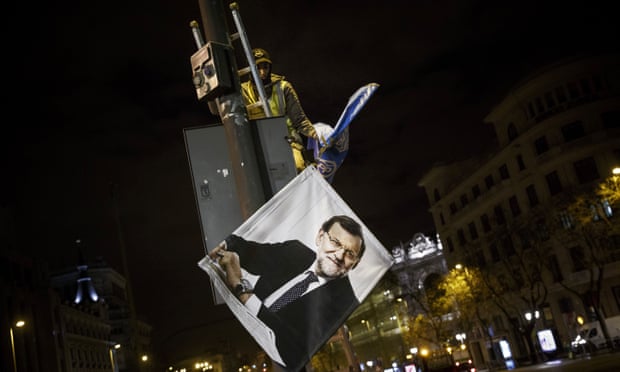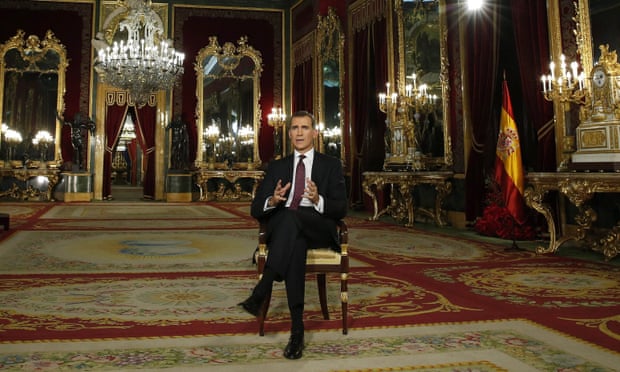Will a brave new Spain rise from the election stalemate?
Weary of austerity and corruption, voters broke the two-party system. Now the challenge is to move ahead
Every year before Christmas, when I drive the 400 miles or so home from Madrid to Cadiz, I’m surprised anew by Spain’s beauty, its size and diversity. Flat La Mancha gives way to mountainous Extremadura and then comes the sea in Andalucía. The birdwatching is fantastic: on my way down south this time, I saw storks, vultures, eagles and the odd falcon sitting on a pole.
I was also reminded of how noisy we are. At a road restaurant in Almaraz, I could barely make myself heard when asking for the key to the toilet. Yes, cliches can make sense: Spaniards are lively and stubborn; they like to make their point sometimes simply by yelling.
We all like to think our own country is distinct, but over the past few days, Spain has felt different from the rest of Europe.
Our big event takes place on Christmas Eve, Nochebuena, when families gather together to eat and celebrate after the king’s speech at 9pm. This Nochebuena, 40 years after Franco’s death, Felipe VI decided to talk for the first time from the royal palace in central Madrid. The sumptous palace has remained uninhabited since 14 April 1931, when Felipe’s great-grandfather Alfonso XIII was forced to leave the country after the Republican victory in the elections.
The king’s decision only added to the extraordinary times that we have been living through. For the past four years of conservative rule, change has been in the air and last weekend citizens stamped change firmly on their votes. The elections dealt a severe blow to bipartidismo, the system that has prevailed since Franco’s death, with the conservative Partido Popular (PP) and socialist Partido Socialista Obrero Español (PSOE) taking turns to govern.
Last Sunday, the prime minister, Mariano Rajoy won the greatest number of votesbut lost his parliamentary majority. His PP, which just four years ago won a landslide victory, lost more than 3 million votes, securing only 28% of those cast. Pedro Sánchez, PSOE’s leader, lost more than a million votes, although it’s been only 18 months since he replaced Alfredo Pérez Rubalcaba, the new face in theory replacing the old guard. Sánchez, however, won only 21% of the vote.
Where did those million of “lost” votes go? To the left, with Podemos, where pony-tailed Pablo Iglesias, a 37-year-old political scientist, took more than 20% of the vote. And to the centre, with Ciudadanos, where baby-faced Albert Rivera, a 36-year-old Catalan lawyer, ended up in fourth place with nearly 14% of the vote.
Why has this happened? A key reason is that PP and PSOE represent a way of doing politics that many Spaniards now deem obsolete and at the root of many of the country’s ills, including chronic corruption. Rajoy’s shaky political standing is also, of course, down to austerity. But it can’t explain Sánchez’s poor results: he has not been governing, or even leading, his party for most of the past four years.
Podemos, a heir of the social protests that swept Spain from May 2011, was founded by a group of university professors, with origins on the far left. But its charismatic leader, Iglesias, has worked hard in the past months to drive Podemos into the mainstream, and he will have a lot to say in my country’s future. He is smart and ambitious, and has learned from what went right and wrong for Syriza in Greece.

Ciudadanos is business-friendly and anti-corruption. But, according to a tall tale that’s being put around, big companies (the Ibex 35, the Spanish stock exchange) funded Rivera to stop Podemos taking the whole of the protest vote. The rumour worked well and Ciudadanos failed to meet expectations. Rivera, however, remains an important player in a fragmented political scenario.
For all the changes, 40 years after Franco Spain still divides almost perfectly along the left-right lines that took us to the 1936 civil war. In parliament, the sum of PP and Ciudadanos seats is 163 while PSOE and Podemos, together, hold 159.
But there is more to these numbers than ideology. We are also in the realm of morals. Much in the way that popular discontent led, last year, to the premature abdication of King Juan Carlos, last Sunday Spaniards said “enough” to quite a few things.
First of all, to austerity. The economic recovery has been distinctly unequal. London is the new mecca for overqualified young Spaniards – engineers, architects, doctors. Many are waiters, a grim reminder of those other Spaniards forced to leave in the 1960s. Many families miss their new “exiles”, as Iglesias likes to call them.
The country is growing at a 3% rate this year, but unemployment remains at 21%. In some provinces, such as Cadiz, from where I write, unemployment among the under-25s is as high as 69%. This is unbearable.
Second, but felt very intesely, is corruption. Political cronyism has grown to a degree that was unknown even under Franco’s rotten regime. PSOE kickstarted this wretched tendency in the 80s under Felipe González. Under Mariano Rajoy’s PP it has reached its highest levels yet.
Only last week we learned that Rodrigo Rato, a former PP economic minister and a fomer IMF chief, will face charges for using his so-called black credit card to buy both alcohol and religious pieces of art. The card was a freebie from Bankia, the bank he used to head. In June 2012, the European Union had to partially rescue Spain with €41,000m to stop Bankia’s fall from creating a meltdown in our banking system. This is deeply embarrassing.
Anger then lies behind the highly fragmented parliament. There will be weeks of uncertainty as politicians try to form a coalition government. Because of our bloody history, we fear instability. These days, there are two further powerful reasons to shy away from it: Spain is slowly recovering from the economic crisis and it faces the challenge of the independent movement, particularly in Catalonia, where up to two million people do not want to belong to Spain.
Most parties agree that there needs to be constitutional reform to include these Spaniards who want to be something else (Basques or Galicians as well as Catalans). But politicians do not agree on what exactly to change. Spain’s unity is regarded as a red line for PP, PSOE and Ciudadanos. The right to decide (or to vote) is another for Podemos and the nationalist parties.
A new Spain was born on 20 December 2015. Politicians must now try to master the art of compromise. What’s more, if Spaniards learn at the same time how to lower their voice when talking, political instability will have come to us with a silver lining.
Ana Romero is an award-winning political journalist for El Español. Her latest book, Final de Partida, on the abdication of King Juan Carlos, is a national bestseller







No comments:
Post a Comment
Please leave a comment-- or suggestions, particularly of topics and places you'd like to see covered